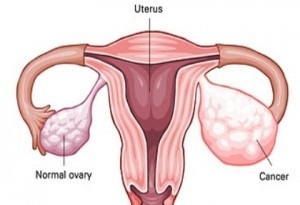What Causes Ovarian Cancer?
May 1, 2015 | Author: Susan Silberstein PhD
According to the Mayo Clinic website, “It’s not clear what causes ovarian cancer.” Admitted WebMD, “Experts don’t know exactly what causes ovarian cancer.” And the American Cancer Society website states, “Having a risk factor, or even many risk factors, does not mean that you will get the disease. And many people who get the disease may not have had any known risk factors. Even if a woman with ovarian cancer has a risk factor, it is very hard to know what part that risk factor might have played in the development of the cancer.” Confused yet?
Women who wish to lower their risk of getting ovarian cancer may feel quite disempowered by the above conclusions, which essentially say if we don’t know why women get it, we don’t know how to prevent it. Here’s what we do know:
Common Risk Factors
Conventional wisdom considers that the following factors are linked to a rise in ovarian cancer risk:
- Increasing age
- Obesity
- Breast cancer
- Family history of ovarian cancer
- Family history of breast cancer
- Family history of colorectal cancer
- Genetic mutations – About 10 % of ovarian cancers are thought to be caused by mutations in the BRCA1 or BRCA2 genes. The risk for women who have these gene changes is much higher than for women without them.
Factors linked to lower risk of ovarian cancer include:
- Pregnancy
- Breastfeeding
- Birth control pills
- The contraceptive injection depomedroxyprogesterone acetate (DMPA or Depo-Provera)
- Having your “tubes tied” (tubal ligation)
- Removal of the uterus (hysterectomy) without removing the ovaries
- Low-fat diet (how much constitutes “low fat” is a matter of opinion)
Less Known Risk Factors
HRT (Hormone Replacement Therapy)
A 2001 study from Emory University published in the Journal of the American Medical Association (JAMA) found that women who used estrogen-only hormone therapy had a 51% increased risk of ovarian cancer. Other research results published in JAMA in 2009 by Danish scientists showed that conventional hormone replacement therapy increases the risk for ovarian cancer by 20 to 30%. In that study, researchers evaluated more than 909,000 Danish women, ages 50 to 79. After an average of eight years of follow-up, 3,068 cases of ovarian cancer were found. Current hormone therapy users had an overall 38% increased risk of ovarian cancer as opposed to those who never used HRT.
More recently, Ken Pope’s post “Hormone Replacement Therapy Linked to Ovarian Cancer” (13 Feb. 2015), called attention to a review of multiple studies linking hormone replacement therapy to ovarian cancer. The Collaborative Group on Epidemiological Studies of Ovarian Cancer has completed a meta-analysis of 52 studies on menopausal hormone use and ovarian cancer risk. The article, scheduled for publication in the British medical journal Lancet, concludes:
“The findings that ovarian cancer risk is greatest in current users of hormone therapy, falls after use ceases, and varies by tumour type, strongly suggest a causal relationship–ie, that among otherwise similar women, use of hormone therapy increases the probability of developing the two most common types of ovarian cancer….The definite risk of ovarian cancer that is observed even with less than five years of use starting at around age 50 years is directly relevant to current patterns of hormone therapy use….”
Hopefully, as a result of this meta-analysis, the European, US and World Health Organization guidelines about hormone therapy — which heretofore have not mentioned ovarian cancer — will soon be revised. There are still some six million users of hormone therapy in the USA and the UK, in addition to a similar number in other high-income countries.
Do bio-identical hormones carry the same risk? Possibly. The lead author of the 2009 Danish study thinks that conclusions from research on synthetic HRT containing estrogen can be applied to bioidentical hormone therapy. She concluded:
“The research on estrogen, bioidentical or synthetic, makes it clear that it can increase the risk of ovarian cancer,” but she admits she did not include women on natural progesterone therapy in that analysis. And other researchers downplay the association, depending on the types and amounts of bioidentical hormones used. Bottom line: Bioidentical HRT is likely to be much safer, but not failsafe, and you should incorporate in your lifestyle additional ways to prevent cancer.
In my next blog in this series, I will write about other less-known risk factors for ovarian cancer.
Join the conversation: Ask Holistic Cancer Coach Facebook Group
References:
[1] http://www.mayoclinic.org/diseases-conditions/ovarian-cancer/basics/causes/CON-20028096
[2] http://www.webmd.com/ovarian-cancer/guide/ovarian-cancer-cause
[3] http://www.cancer.org/cancer/ovariancancer/overviewguide/ovarian-cancer-overview-what-causes
[4] http://bit.ly/KenPopeStudyOfHRTOvarianCancer
[5] http://www.virginiahopkinstestkits.com/hormonesovariancancer.html
[6] http://www.webmd.com/ovarian-cancer/news/20090714/hormone-therapy-ups-ovarian-cancer-risk
[7] Mørch LS, Løkkegaard E, Andreasen AH et al. Hormone Therapy and Ovarian Cancer, JAMA. 2009;302(3):298-305
[8] Rodriguez C, et al. Estrogen replacement therapy and ovarian cancer mortality in a large prospective study of US women. JAMA 2001 Mar 21;285(11):1460-5.
